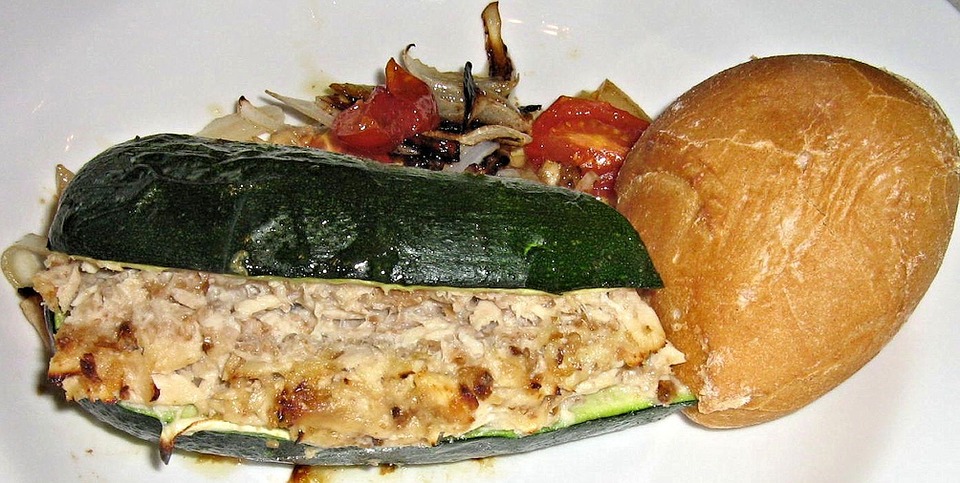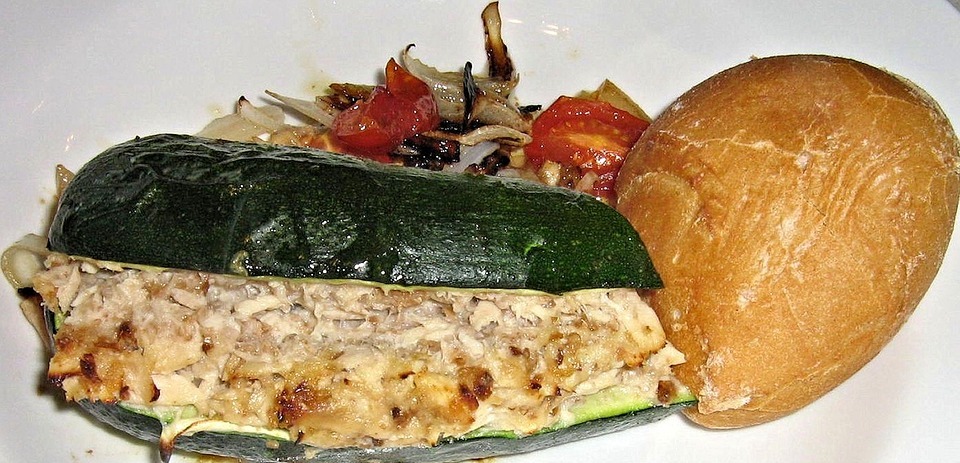This comprehensive guide delves into the question of whether dogs can safely enjoy zucchini, exploring its nutritional profile, potential risks, and practical tips for incorporating this versatile vegetable into your canine companion's diet. We'll also address common concerns and provide detailed answers to frequently asked questions.
Part 1: The Nutritional Powerhouse of Zucchini for Dogs

1.1. A Low-Calorie, High-Fibre Treat
Zucchini is a low-calorie vegetable, making it a suitable snack for dogs, especially those watching their weight. Its high fibre content aids in digestion and promotes healthy bowel movements, contributing to a feeling of fullness and potentially helping with weight management.
1.2. Abundant Vitamins and Minerals for Canine Wellness
This green veggie is brimming with essential vitamins and minerals that contribute to your dog's overall health:
- Vitamin C: Supports immune function and aids in collagen production, which is crucial for strong bones, tendons, and ligaments.
- Vitamin K: Essential for blood clotting, helping to prevent excessive bleeding in case of injury.
- Potassium: Helps regulate blood pressure and muscle function, ensuring efficient muscle contractions and optimal heart health.
- Manganese: Supports bone health, aids in energy metabolism, and plays a role in wound healing.
- Vitamin A: Crucial for healthy vision, skin, and coat, promoting a lustrous shine and strong immune function.
- Vitamin B6: Plays a role in brain function, red blood cell production, and protein metabolism.
1.3. Antioxidants for Cellular Protection
Zucchini is rich in antioxidants, which help protect cells from damage caused by free radicals. This protective action may contribute to a reduced risk of chronic diseases and inflammation, promoting overall health and longevity.
Part 2: Navigating the Safety of Zucchini for Dogs

2.1. Raw vs. Cooked Zucchini: Understanding the Difference
While both raw and cooked zucchini are generally safe, cooked zucchini is easier for dogs to digest and may reduce the risk of gastrointestinal upset. Cooking breaks down the cell walls, making the nutrients more accessible and reducing the potential for digestive issues.
2.2. Safe Zucchini Preparation: Essential Tips
- Thorough Washing: Wash zucchini thoroughly under running water to remove any dirt, pesticides, or residues.
- Removing Seeds: Seeds can be a choking hazard for smaller dogs, so removing them is advisable, especially for smaller breeds.
- Avoiding the Skin: The skin can be difficult for some dogs to digest, especially if they are sensitive or have a history of digestive issues. It's best to remove or cook the skin for easier consumption.
- Cooking Methods: Zucchini can be cooked in a variety of ways: steaming, baking, or grilling. Avoid adding salt, butter, or other seasonings that are not suitable for dogs.
2.3. Potential Side Effects: Recognizing Possible Reactions
In rare cases, dogs may experience mild digestive upset after consuming zucchini, such as:
- Diarrhoea: This is usually mild and temporary, but if it persists or becomes severe, consult your veterinarian.
- Vomiting: This is also usually mild and may be related to eating too much zucchini. Monitor your dog's behaviour and consult your veterinarian if necessary.
- Gas: This is a common occurrence with high-fibre foods and usually resolves on its own.
2.4. Avoiding Zucchini Toxicity: Understanding the Risks
Zucchini itself is non-toxic to dogs, but the plant's leaves and flowers contain a compound called cucurbitacin, which can be toxic if ingested. It is crucial to avoid feeding your dog any part of the plant except the fruit itself.
Part 3: Incorporating Zucchini into Your Dog's Diet

3.1. Gradual Introduction: A Sensible Approach
Start by introducing zucchini gradually. Offer small amounts initially and observe your dog's reaction. Monitor their behaviour for any signs of digestive upset or adverse reactions.
3.2. Serving Size Recommendations: Tailoring to Individual Needs
The appropriate serving size will vary depending on your dog's size and weight. As a general guideline:
- Small Dogs: A few small pieces of cooked zucchini, about the size of a grape.
- Medium Dogs: A few tablespoons of cooked zucchini.
- Large Dogs: A quarter cup or less of cooked zucchini.
3.3. Creative Zucchini Treats: Enticing Your Dog's Palate
- Zucchini Bites: Cook zucchini slices and cut them into bite-sized pieces, making them easy and enjoyable for your dog to consume.
- Zucchini Dog Biscuits: Zucchini can be added to homemade dog biscuit recipes, adding a healthy twist and making them more appealing.
- Zucchini and Meat Mix: Combine cooked zucchini with lean meat, such as chicken or turkey, for a balanced and delicious meal that provides protein and nutrients.
Part 4: Benefits of Adding Zucchini to Your Dog's Diet
4.1. Weight Management: Helping Your Dog Maintain a Healthy Weight
Zucchini's low-calorie content and high fibre content can aid in weight management for overweight dogs. The fibre helps your dog feel fuller for longer, reducing the urge to overeat.
4.2. Improved Digestion: Promoting a Healthy Digestive System
The fibre in zucchini helps regulate bowel movements and supports a healthy digestive system. It can help prevent constipation and promote regular bowel function.
4.3. Enhanced Skin and Coat Health: A Shiny and Healthy Coat
The vitamins and minerals in zucchini contribute to healthy skin and a shiny coat. Vitamin A, in particular, plays a vital role in maintaining skin health and promoting a glossy coat.
4.4. Potential Reduction in Cancer Risk: Protecting Your Dog's Health
The antioxidants present in zucchini may help protect cells from damage, potentially reducing the risk of certain cancers. This preventive effect adds another layer of protection to your dog's overall health.
Part 5: When to Avoid Feeding Zucchini to Your Dog
5.1. Dogs with Digestive Sensitivities: Recognizing Potential Issues
Dogs with known digestive sensitivities may experience more severe adverse reactions to zucchini. If your dog has a history of digestive issues, it's best to consult with your veterinarian before introducing zucchini.
5.2. Dogs on Restricted Diets: Tailoring to Specific Needs
Dogs on restricted diets, such as those with kidney or liver issues, may need to avoid zucchini due to its potassium content. Consult with your veterinarian to determine the appropriate dietary restrictions for your dog's condition.
5.3. Dogs with Food Allergies: Identifying Potential Allergens
Some dogs may develop allergies to certain vegetables, including zucchini. If your dog experiences any signs of an allergic reaction, such as itching, swelling, or breathing difficulties, stop feeding zucchini and contact your veterinarian immediately.
Part 6: FAQs: Answering Your Questions
6.1. Can dogs eat zucchini skin?
While zucchini skin is technically edible, it's generally recommended to remove it, especially for smaller dogs, as it can be difficult to digest. For larger dogs, you can try removing the skin or cooking it thoroughly for easier digestion.
6.2. Is zucchini good for dogs with diabetes?
Zucchini is generally safe for dogs with diabetes. However, it's important to consult with your veterinarian for personalized dietary recommendations, as they can adjust the amount and frequency based on your dog's specific needs.
6.3. Can dogs eat zucchini bread?
Zucchini bread contains ingredients like sugar, butter, and flour that are not suitable for dogs. It's best to avoid giving your dog any commercially prepared baked goods, as they often contain ingredients that can be harmful.
6.4. What are the signs of zucchini toxicity in dogs?
Symptoms of zucchini toxicity are rare but may include vomiting, diarrhoea, lethargy, and loss of appetite. If you suspect your dog has ingested a toxic part of the zucchini plant, contact your veterinarian immediately.
6.5. Can I give my dog zucchini every day?
Moderation is key. Zucchini should be given as an occasional treat or part of a balanced meal. Avoid giving it too frequently, as it can lead to digestive issues or nutrient imbalances.
6.6. How much zucchini can I give my dog?
The recommended serving size will vary depending on your dog's size and weight. Start with small amounts and gradually increase as tolerated. Always observe your dog for any signs of adverse reactions and consult with your veterinarian for specific guidance.
Conclusion:
Zucchini can be a healthy and nutritious addition to your dog's diet when incorporated responsibly. Remember to consult with your veterinarian before introducing any new foods to your pet's diet. By following these guidelines, you can ensure your canine companion enjoys the benefits of this versatile vegetable while staying safe and healthy.
Everyone is watching
-

Can Dogs Eat Bananas? A Guide to Safe Treats
DOGS & PUPPIESThis comprehensive guide will delve into the world of canine nutrition, focusing on the popular question: can ...
-

Can Dogs Eat Oranges? (Is It Safe or Toxic?)
DOGS & PUPPIESThis article delves into the question of whether dogs can safely consume oranges. We'll explore the nutrition...
-

Can Dogs Eat Grapes? The Shocking Truth About This Fruit
DOGS & PUPPIESThis article delves into the controversial topic of grapes and dogs, exploring the potential dangers associate...
-

Why Do Dogs Eat Poop? Understanding Coprophagia in Dogs
DOGS & PUPPIESThis article delves into the perplexing phenomenon of coprophagia, the act of eating faeces, in dogs. We explo...
-

Can Dogs Eat Shrimp? A Guide to Safety and Risks
DOGS & PUPPIESThis comprehensive guide dives into the world of shrimp and dogs, exploring the potential benefits and risks a...
